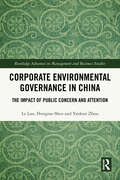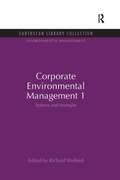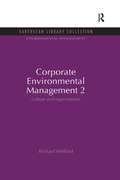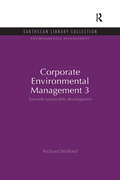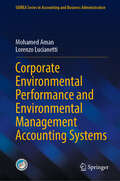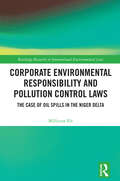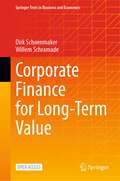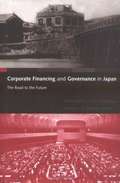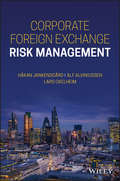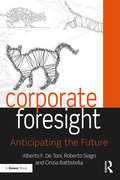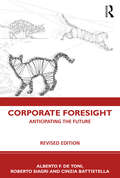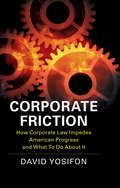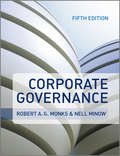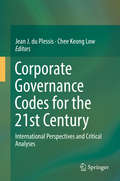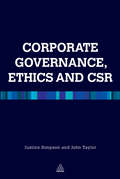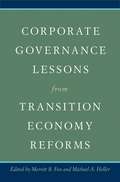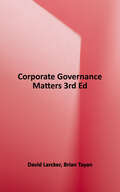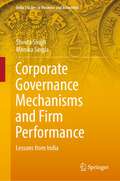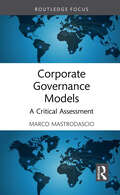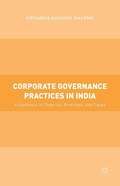- Table View
- List View
Corporate Environmental Governance in China: The Impact of Public Concern and Attention (Routledge Advances in Management and Business Studies)
by Le Luo Hongtao Shen Yankun ZhouThe book explores how diverse stakeholder groups—particularly community and regulatory stakeholders—shape corporate environmental practices. Focusing on one of the world’s largest economies, this book provides an in-depth analysis of stakeholder dynamics and their impact on corporate environmental performance and disclosure.Environmental governance has become a global imperative as environmental crises intensify and stakeholder expectations grow. The book examines the interplay between community advocacy and regulatory actions and particularly focuses on how community stakeholders drive corporate accountability by pressuring regulatory authorities to enforce stricter measures or provide financial incentives. The chapters include discussions on the role of public environmental awareness and concern in shaping corporate performance and disclosure practices. The book also highlights how regulatory influence mediates the relationship between community influence and corporate environmental outcomes, offering new insights into the interactive dynamics of stakeholder influence.This book will be of interest to policymakers, corporate managers, and academics seeking to understand the nuanced relationships between businesses, governments, and communities. It offers actionable recommendations for fostering effective environmental governance and sustainable corporate practices.
Corporate Environmental Management 1: Systems and Strategies (Environmental Management Set)
by Richard WelfordThis volume presents a comprehensive analysis of the role of business in safeguarding the environment. It introduces general issues and context, and then gives a detailed, critical examination of all the key tools of corporate environmental management systems and standards: environmental policies, guidelines and charters, environmental auditing, life-cycle assessment, the measurement of environmental performance, and environmental reporting. The book emphasizes systems-based environmental management, and also considers how such an approach might be integrated within local authorities and small and medium-sized companies. It then extends the systems approach to cover continuous environmental improvement, building a corporate environmental profile and moving towards sustainability. Written in a clear and informative style with checklists, explanatory notes and references for further reading, the book draws on the existing environmental strategies of a number of leading firms. Each chapter is written by contributors involved in ongoing research and consultancy in their specialist area. The book's focus makes it useful reading, not only for students and researchers, but also for managers faced with the challenge of introducing environmental management strategies into their own organizations.
Corporate Environmental Management 2: Culture and Organization (Environmental Management Set)
by Richard WelfordThe second book in a series looking at management techniques which could be implemented by a business in order to improve its environmental performance, this text identifies the best practices and examines the key tools within the framework of corporate environmental management. Richard Welford and contributors explore the various organizational and cultural concepts which firmly place the corporate environmental management agenda within the human dimension.
Corporate Environmental Management 3: Towards Sustainable Development (Environmental Management Set)
by Richard WelfordThis third book in the Corporate Environmental Management series examines the sorts of strategies that companies can put into place to make their performance more consistent with the concept and practice of sustainable development whilst taking into account the impacts of free trade and globalization. This book: tackles the nature of the international economic order and the efficacy of free trade; outlines strategies for managers, researchers and academics to develop operations consistent with sustainable development; and, finally, offers substantial references to leading articles in the field.
Corporate Environmental Management, Second Edition
by John DarabarisCorporate Environmental Management, Second Edition, provides environmental industry executives, the investment community, and students a basis for measuring corporate environmental activities and standing. It offers a comprehensive understanding of the technical, cost, and regulatory issues that environmental managers face. Sustainable development, conservation environmental science, and emissions trading are examined, as well as issues such as RCRA and CERCLA hazardous and chemical waste management. <P><P>This new edition is updated throughout and adds a chapter on the newer global environmental guidelines and regulations (Paris Climate Agreement, North American Free Trade Agreement (NAFTA), Trans-Pacific Partnerships (TPP)).
Corporate Environmental Performance and Environmental Management Accounting Systems (SIDREA Series in Accounting and Business Administration)
by Mohamed Aman Lorenzo LucianettiThis book provides insights into the role of environmental management accounting practices and the impact of various governance aspects dedicated to the environment in enhancing corporate environmental performance. It also examines the extent of environmental disclosure based on organizational-level data from Italian listed firms. These mechanisms work together to influence policies and management decisions, particularly in guiding businesses towards more sustainable choices. The book suggests that firms can use robust and versatile governance mechanisms to improve managerial oversight by incorporating diverse viewpoints, ideas, perspectives, and abilities into the decision-making process. This, in turn, may lead to better performance. Effective governance drives change towards a cleaner environment by tapping into untapped potential, such as eco-friendly operations, and optimizing resource utilization. Additionally, the book emphasizes the role of environmental management accounting systems in helping firms better coordinate, measure, and manage their capabilities, thereby achieving improved environmental performance.
Corporate Environmental Responsibility and Pollution Control Laws: The Case of Oil Spills in the Niger Delta (Routledge Research in International Environmental Law)
by Millicent EleThis book critically examines the corporate environmental responsibility of major oil companies operating in Nigeria’s Niger Delta, focusing on oil spills and comparing regulatory frameworks in Nigeria, the US, the UK, and the EU. It provides a theoretical foundation for holding these companies to the same environmental standards in Nigeria as they adhere to in more advanced jurisdictions.Analysing Shell’s oil spill environmental performance data, the book assesses how its operations in Nigeria compare with global performance figures. Additionally, it evaluates Nigerian environmental laws, highlighting deficiencies that may contribute to persistent oil pollution. Furthermore, it explores issues of regulatory capture, corporate environmental crime, and the transnational litigation of Nigerian oil spill cases in the US, the UK, and the EU. The Petroleum Industry Act (PIA) 2021 is comprehensively assessed in the context of corporate environmental governance and oil pollution control.To propose solutions, the book examines legal frameworks for strengthening corporate due diligence and accountability. It advocates for a robust legal regime to address the clean-up liability of pre-existing (stale) oil spills in the Niger Delta, drawing insights from the UK/EU laws on contaminated land, the US Comprehensive Environmental Response, Compensation, and Liability Act (CERCLA or the Superfund), and the UK laws on oil infrastructure decommissioning. Additionally, the book introduces a novel failure to prevent oil spill offence in Nigeria, an omission-based liability inspired by the UK Bribery Act 2010 and the UK Criminal Finances Act 2017.This book will be of interest to researchers and practitioners in the field of environmental law, pollution, and land law.
Corporate Environmental Responsibility in Investor-State Dispute Settlement: The Unexhausted Potential of Current Mechanisms
by Tomoko IshikawaThis book explores the potential of the current investor-state dispute settlement (ISDS) mechanism to materialise the responsibility of foreign investors through the states' counterclaims and defences at the jurisdictional, merits, and quantum phases. In doing so, it seeks to incorporate the recent developments of ISDS in both international and domestic laws of certain jurisdictions on corporate responsibility, including the parent company's due diligence and legal effects of corporations' voluntary commitments. The book also reflects the interests and perspectives of the victims who suffered loss and injury due to investors' conduct. The author demonstrates that the current system does have the inherent potential to advance responsible investment, even though reforms are needed to overcome its limitations. Fully utilising this potential to reflect investor responsibility in IIA-based dispute settlement mechanisms will help to develop practices based on greater due diligence and responsible business conduct.
Corporate Finance for Long-Term Value (Springer Texts in Business and Economics)
by Dirk Schoenmaker Willem SchramadeThis open access textbook offers a guide to corporate finance for modern companies that want to create long-term value. Drawing on recent literature on sustainable companies, it starts by analysing the Sustainable Development Goals as a strategy for the transition to a sustainable economy. Next, it translates the general concept of sustainability into core corporate finance methods, such as net present value, company valuation, cost of capital, capital structure and M&A.Current corporate finance textbooks are primarily based on the shareholder model, designed to maximise financial value. This book instead adopts the integrated model, which argues that companies have to serve the interests of their current and future stakeholders. Accordingly, companies move from simply maximising financial value to optimising integrated value, which combines financial, social and environmental value. Applying this new paradigm of integrated value is the truly innovative feature of this textbook.Written for undergraduate and graduate students of Finance, Economics, and Business Administration, this textbook provides a fresh analysis of corporate finance. Combining theory, empirical data and examples from actual companies, it reveals the sustainability challenges for corporate investment and shows how finance can be used to steer funds to sustainable companies and projects and thus accelerate the transition to a sustainable economy.
Corporate Financing and Governance in Japan: The Road to the Future
by Takeo Hoshi Anil Kashyap Stanley Fischer45th Nikkei Prize for Excellent Books in Economic Science, presented by the Japan Center for Economic Research and Nihon Keizai Shimbun Inc. on November 5, 2002. In this book Takeo Hoshi and Anil Kashyap examine the history of the Japanese financial system, from its nineteenth-century beginnings through the collapse of the 1990s that concluded with sweeping reforms. Combining financial theory with new data and original case studies, they show why the Japanese financial system developed as it did and how its history affects its ongoing evolution. The authors describe four major periods within Japan's financial history and speculate on the fifth, into which Japan is now moving. Throughout, they focus on four questions: How do households hold their savings? How is business financing provided? What range of services do banks provide? And what is the nature and extent of bank involvement in the management of firms? The answers provide a framework for analyzing the history of the past 150 years, as well as implications of the just-completed reforms known as the "Japanese Big Bang. " Hoshi and Kashyap show that the largely successful era of bank dominance in postwar Japan is over, largely because deregulation has exposed the banks to competition from capital markets and foreign competitors. The banks are destined to shrink as households change their savings patterns and their customers continue to migrate to new funding sources. Securities markets are set to re-emerge as central to corporate finance and governance.
Corporate Foreign Exchange Risk Management
by Lars Oxelheim Alf Alviniussen Håkan JankensgårdA practical and accessible guide that demystifies ForEx risk for managers in all areas of business Virtually any organisation active in the global economy is impacted by fluctuations in foreign exchange (FX or ForEx) markets. Managers need to understand this increasingly complex issue and measure their firm’s exposure to risk. Corporate Foreign Exchange Risk Management is an in-depth yet accessible guide on effective ForEx exposure management. Designed for professionals responsible for managing a profit & loss or balance sheet influenced by ForEx fluctuations, it enables risk managers to navigate the interconnected worlds of financial management and economics. This innovative guide integrates academic discussion of the economics of risk management decisions and pragmatic advice for various situations in which performance measures affected by accounting standards are paid considerable attention. Readers are provided with the tools and knowledge required to handle a broad range of issues related to ForEx risk management. Clear, non-technical chapters demystify concepts that often appear complicated and confusing to managers. Written by globally-recognised experts in corporate finance, risk management and international business, this book: Employs a reader-friendly narrative style to explain complex concepts Provides a clear, actionable risk management strategy which can be used in a variety of businesses Places all concepts in relatable, real-world contexts Explains important academic research to practitioners in plain English Includes effective pedagogical tools and explanations, straightforward examples and end-of-chapter summaries which highlight key points Corporate Foreign Exchange Risk Management is a must-read for any manager who deals with corporate exposure to ForEx risk, as well as analysts wishing to better understand the relation between corporate performance and ForEx fluctuations and students of corporate risk management.
Corporate Foresight: Anticipating the Future
by Alberto F. De Toni Roberto Siagri Cinzia BattistellaThis book illustrates how to anticipate the future using more than the traditional predictive models (forecasting) based on the forward projection of past experiences, and moving into more advanced methods of anticipation logic (foresight) to build probable scenarios based on weak signals, emerging trends, coexisting presents and potential paths of evolution. Utilizing a helpful, four-part structure, the authors indicate how corporate foresight is fundamental to interpret and lead change, focusing on the two cornerstones of organization and management. They advocate the separation of Research (oriented to the market of tomorrow) from Development (oriented to the market of today), the establishment of a Foresight unit and the concentration of research activities mainly on the acquisition and recombination of external know-how. After an overview of state-of-the-art literature on forecasting methods, they further propose the implementation of a "future coverage" methodology, which will enable companies to measure and verify the consistency between trends, strategic vision and offered products. These organizational and managing tools are then tested in a case study: the Italian company Eurotech SpA, a leader in the ICT sector. A useful resource for both managers and researchers, the book will help readers gain the tools necessary to tackle change and navigate complexity in organizations.
Corporate Foresight: Anticipating the Future
by Alberto F. De Toni Roberto Siagri Cinzia BattistellaThe world changes like the patterns in a kaleidoscope: trends expand, contract, break up, melt, disintegrate and disappear, while others are formed. Change – as opposed to stasis - is our normal condition, the only certainty in our lives. Hence the need to create tools that provide organizations with the means to tackle change and navigate complexity. We must accept the reality of constant change and be prepared to a heavy shift in perspective: interconnection versus separation, acceleration versus linearity, discontinuity versus continuity. Anticipating the future requires more than the traditional predictive models (forecasting) based on the forward projection of past experiences. Advanced methods use anticipation logic (foresight) and build probable scenarios taking into account weak signals, emerging trends, coexisting presents and potential paths of evolution. Corporate foresight is fundamental to interpret and lead change. The two cornerstones of foresight are organization and management. As concerns organization, the authors advocate the separation of Research (oriented to the market of tomorrow) from Development (oriented to the market of today), the establishment of a Foresight unit and the concentration of research activities mainly on the acquisition and recombination of external know-how. As regards management, after an overview of state-of-the-art literature on forecasting methods, the authors propose the implementation of a "future coverage" methodology, which enables companies to measure and verify the consistency between trends, strategic vision and offered products. These organizational and managing tools are then tested in a case study: the Italian company Eurotech SpA, a leader in the ICT sector.
Corporate Fraud Across the Globe
by Adela McMurray Larry LiBased on theoretical foundations and evidence-based case studies, this book identifies the fundamental motivations underpinning corporate fraud in both developing and developed countries. The book offers practical solutions in terms of monitoring and potentially preventing future corporate fraud activity. It is expected that uncovered corporate fraud negatively affects the public reputation, and financial performance of fraudulent firms. However, what is of more importance for fraudulent firms is how to regain the trust of customers, investors, and other stakeholders, as this impacts the long-term sustainability of businesses. Operational strategies, including reform, provide an effective channel for a fraudulent firm’s business sustainability yet this notion remains unexplored in the literature. This authored research book argues that the choice of appropriate operational strategies is critical as they serve as an effective channel for fraudulent firms to re-gain the trust from customers and markets, re-establish their reputation, and enhance the firm’s long-term value. The authors posit that there is no ‘one-size fits-all’ approach because the choice of effective operational strategies is needed to acknowledge the significance of context such as industry type, economic conditions, legal frameworks as well as the firm’s fraudulent characteristics.
Corporate Friction: How Corporate Law Impedes American Progress And What To Do About It
by David YosifonCorporate law in the United States requires directors to manage firms in the interests of shareholders, which means never sacrificing profits in service of other stakeholders or interests. <P><P>In this timely, groundbreaking book, David Yosifon argues that this rule of 'shareholder primacy' is logically, ethically, and practically unsound, and should be replaced by a new standard that compels directors of our largest corporations to manage firms in a socially responsible way. In addition to summarizing existing debates on the issue - and giving special attention to the Supreme Court's decision in Citizens United - Yosifon explores the problem of corporate patriotism and develops a novel approach to the relationship between corporate law and consumer culture.<P> The book's technical acumen will appeal to experts, while its engaging prose will satisfy anyone interested in what our corporate law does, and what it should do better.<P> Explains how our existing corporate law causes corporations to behave in socially irresponsible ways.<P> Articulates reforms to make corporations more socially responsible.<P> Reviews and deepens sophisticated corporate law debates in a readable and pleasing prose style.
Corporate Governance
by Robert A. Monks Nell MinowIn the wake of the recent global financial collapse the timely new edition of this successful text provides students and business professionals with a welcome update of the key issues facing managers, boards of directors, investors, and shareholders.In addition to its authoritative overview of the history, the myth and the reality of corporate governance, this new edition has been updated to include:analysis of the financial crisis;the reasons for the global scale of the recessionthe failure of international risk managementAn overview of corporate governance guidelines and codes of practice;new cases.Once again in the new edition of their textbook, Robert A. G. Monks and Nell Minow show clearly the role of corporate governance in making sure the right questions are asked and the necessary checks and balances in place to protect the long-term, sustainable value of the enterprise.Features 18 case studies of institutions and corporations in crisis, and analyses the reasons for their fall (Cases include Lehman Brothers, General Motors, American Express, Time Warner, IBM and Premier Oil.)
Corporate Governance And Financial Management
by Sardar M. N. Islam Siti NuryanahThis book integrates corporate governance, corporate finance and accounting to formulate sound financial management strategies. It offers practical steps for managers using an integrated optimisation financial model to achieve good corporate governance practices which lead to lower risks and higher firm value.
Corporate Governance Codes for the 21st Century: International Perspectives and Critical Analyses
by Jean J. du Plessis Chee Keong LowThe book is the first comprehensive consideration, since the UK Cadbury Report recommended a voluntary Corporate Governance Code, of the question whether Corporate Governance Codes are the most effective way of ensuring adherence to good corporate governance principles. There is no doubt that the idea of voluntary compliance with good corporate governance practices, based on the principle of 'comply or explain', has captured the imagination of the world. It is probably one of the best and most comprehensive examples of 'self-regulation' ever seen in any area where the society could be affected significantly, for current purposes by corporations. However, is this the most effective way of ensuring that corporations act responsibly and adhere to good corporate governance principles? Have these Codes really improved corporate governance practices significantly? Is it time for a rethink and, at least in certain areas, start to rely more on 'hard law' and clearer expectations to ensure compliance? All these issues are addressed in the book.
Corporate Governance Ethics and CSR
by John R Taylor Justine SimpsonCorporate Governance, Ethics and Corporate Social Responsibility brings together the three separate strands relevant to the new demands of organizational behaviour and reporting. Taking a holistic approach to the issue of the role of the organization in society, the responsibilities within which it operates, obligations to its stakeholders (including its employees and their dependents) and the ethical underpinning which has to be in place for any form of honest reporting, the authors look not only at the organization as a reporting entity complying with a set of rules or nebulous concepts but as a functioning part of the business environment. Offering a wealth of real-life examples and case studies, the author demonstrate the realities of balancing socially responsible business with modern business practice in a diverse range of organizations, including both the private and public sector.
Corporate Governance Lessons from Transition Economy Reforms
by Merritt B. Fox & Michael A. HellerCorporate Governance Lessons from Transition Economy Reforms explores a timely topic at the intersection of economics, law, and policy reform. To date, most sophisticated theoretical work on corporate governance has focused on advanced market economies. In post-socialist countries, corporate finance and transition economics scholars have often done little more than convey the received theory to transition policymakers. This volume focuses, for the first time, on the reverse concern: what, if anything, do the reform experiences of transition countries teach about corporate governance theory more generally? To investigate this question, Merritt Fox and Michael Heller have assembled a stellar group of corporate governance theorists. The answers are startling. The principal essays approach the problem from three complementary perspectives that form the organizing themes of the book. The first part refines core corporate theory terms. The second presents important empirical work that explores the channels through which "good corporate governance" may link to the real economy. The final part links corporate governance theory to practical reforms. After fifteen years of experience, practice can now inform theory. Together, these essays present a comprehensive new view on a provocative theme. Written in an accessible style, they will be of interest to a broad range of scholars, commentators, and policymakers.
Corporate Governance Matters: A Closer Look at Organizational Choices and Their Consequences
by David Larcker Brian TayanFully updated for the latest research, trends, and regulations, the Third Edition of this book offers comprehensive and objective information for everyone seeking to improve corporate governance--from directors to institutional investors to policymakers and researchers. To help you design highly effective governance, the authors thoroughly examine current options, reviewing what is and isn't known about their impact on organizational performance. Throughout, they take a strictly empirical and non-ideological approach that reflects rigorous statistical and research analysis and real-life examples. They address issues ranging from board structure, processes, operations, and functional responsibilities to institutional investors, outside stakeholders, and alternative forms of governance.
Corporate Governance Mechanisms and Firm Performance: Lessons from India (India Studies in Business and Economics)
by Shveta Singh Monika SinglaThis book begins by analysing the various corporate governance mechanisms explored in the extant literature and determining their effectiveness in enhancing the firm value using multivariate analysis. The findings are of global relevance as the corporate governance regulations of most countries focus on independent directors as the mainstay of good governance. The empirical evidence from the first objective of this study corroborates the claim that independent directors do not strengthen the firms’ governance quality. The book is one of the few works to have analysed the possible reasons behind the ineffectiveness of the independent directors. Also, in view of the famous concept of the bundle of governance mechanisms, it might be possible that the independent directors strengthen the firms’ governance quality indirectly by strengthening other governance mechanisms. This aspect too has little precedence. This study adopts a novel moderation and mediation approach to analyse the monitoring behaviour of independent directors in relation to other governance mechanisms. The work is a must read for corporate players as well as researchers and scholars studying this discipline.
Corporate Governance Models: A Critical Assessment (Routledge Focus on Business and Management)
by Marco MastrodascioThe activities carried out in a business organization stem from the contribution of subjects who cooperate in the expectation of obtaining adequate rewards. The ability of organizations to reach a specific level of performance is influenced by the ownership structure, while the management is directed and controlled through a set of rules and incentives. This set regulates the distribution of rights and responsibilities among the board, company management and stakeholders, and it defines the corporate governance model adopted by the organization. The collapse of global organizations across the world have undoubtedly revealed the inherent flaws in the contemporary corporate governance practices. As a result of these international scandals, a great deal of multidisciplinary research has been growing restlessly to define the specificities of each corporate governance model, however, lacking a specific investigation into the presumed existence of the most suitable one. By favouring the synthesis and the inductive procedure, this book analyses the potential existence of the most appropriate corporate governance model based on comparative international analysis of cultural, social and economic factors influencing the organization’s choice regarding the corporate governance model to be adopted. This volume will be of interest to researchers, academics, professionals, and students in the fields of corporate governance, international business, and law.
Corporate Governance Practices in India
by Priyanka Kaushik SharmaCorporate Governance Practices in India examines corporate governance practice in Indian industry. This book critically analyses the governance practice and evaluates the needs of corporate governance in the two major industries in India: Auto Industry and Heavy Engineering Industry. The study explores the state of compliance of the key governance parameter in both the industries in line with the mandatory and non-mandatory requirements stipulated by the Revised Clause 49 of (SEBI) ListingAgreement as also the provisions required by the Companies Act, 1956. The book aims to study the concept of corporate governance and check the level of compliance of corporate governance codes in Auto Industry and Heavy Engineering Industry in India, and draw comparisons in the adoption of corporate governance practices by Auto Industry vis-#65533;-vis Heavy Engineering Industry.
Corporate Governance Reforms in the EU: Do They Matter and How?
by Iryna Ivaschenko Petya Koeva BrooksA report from the International Monetary Fund.
